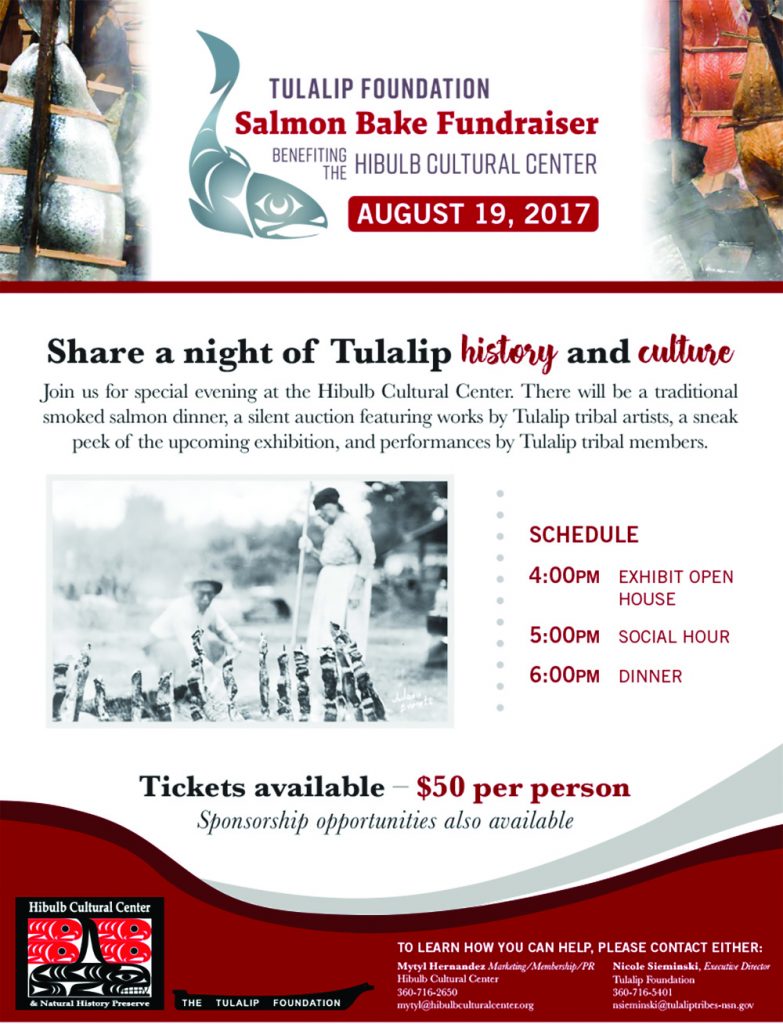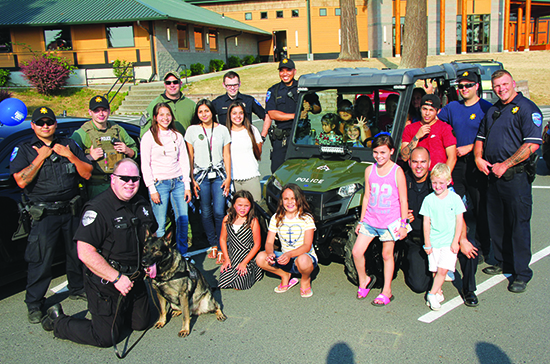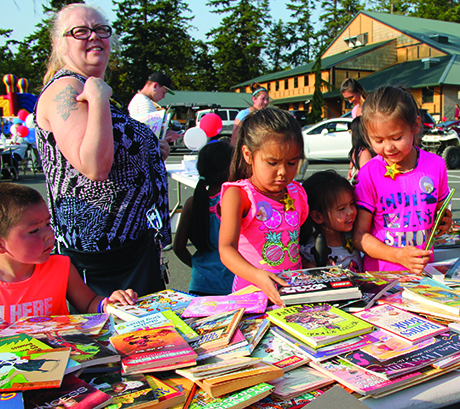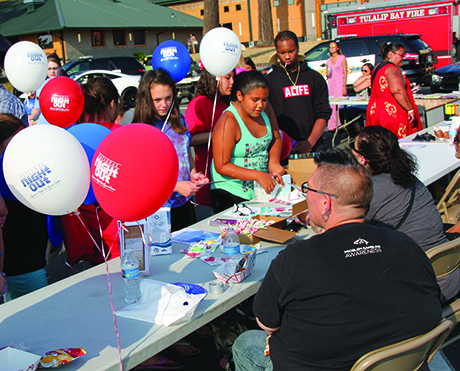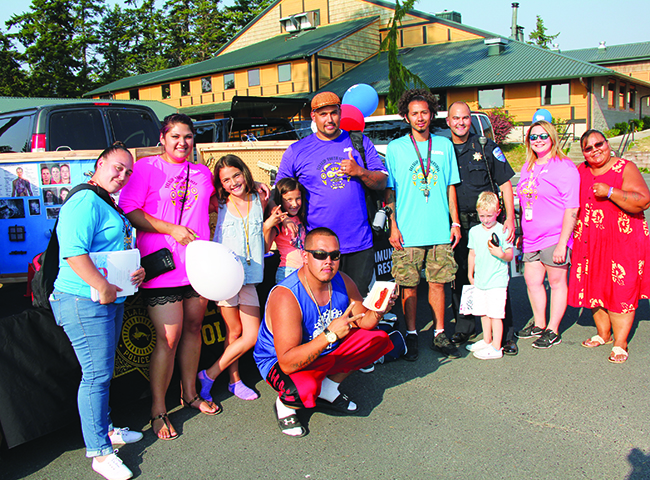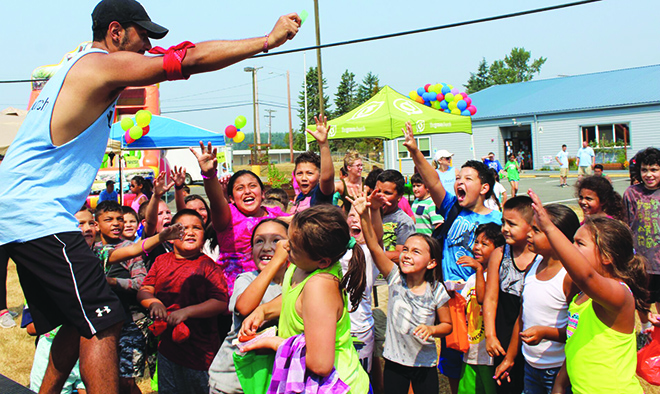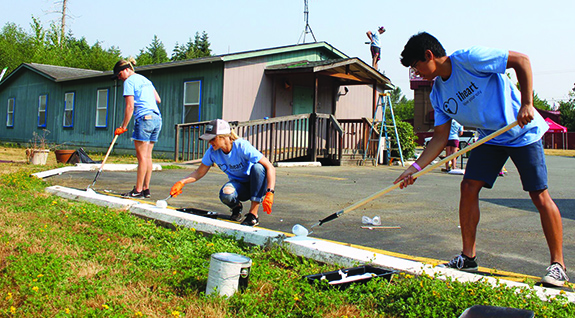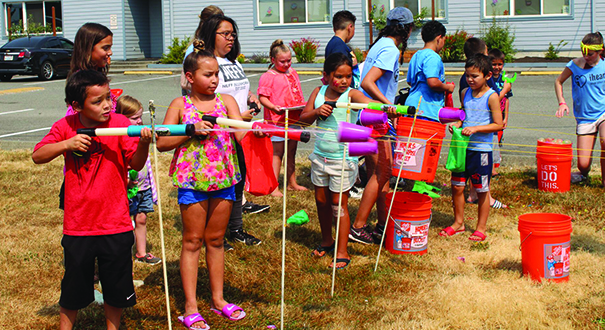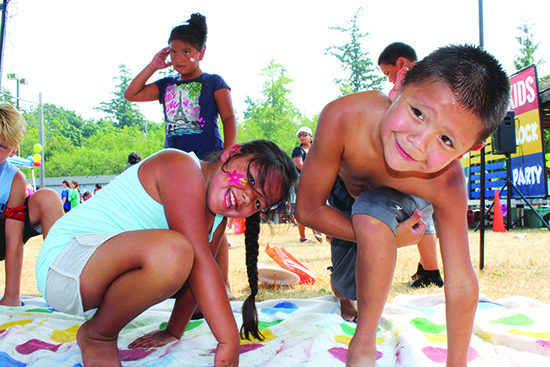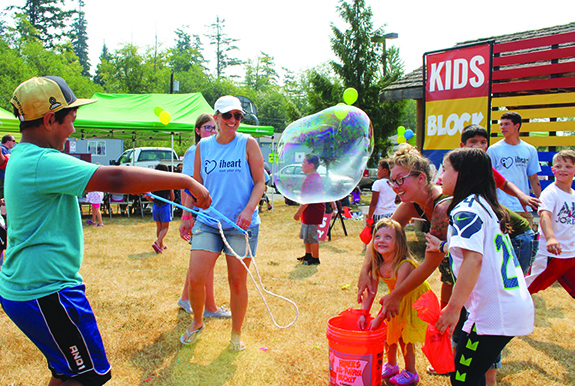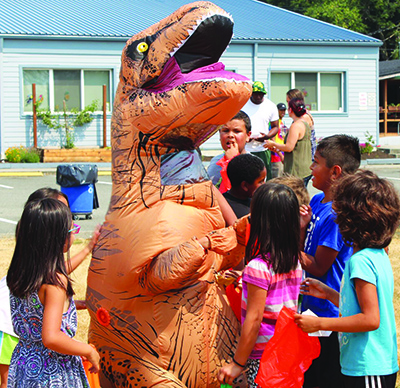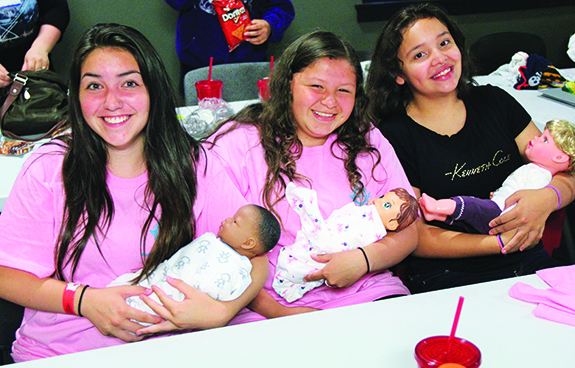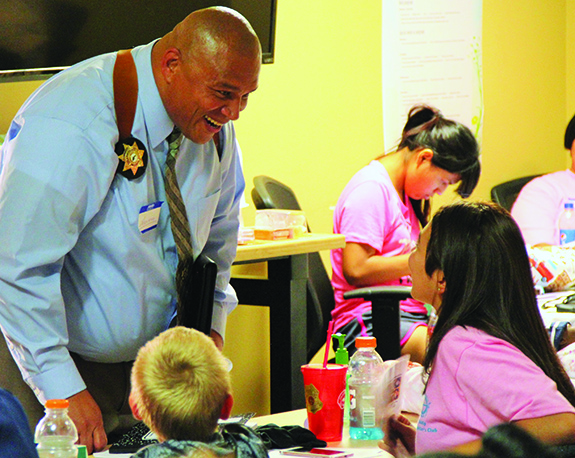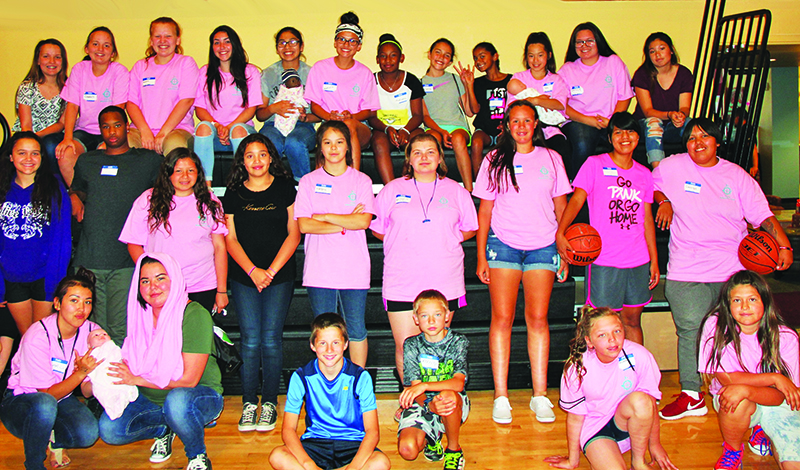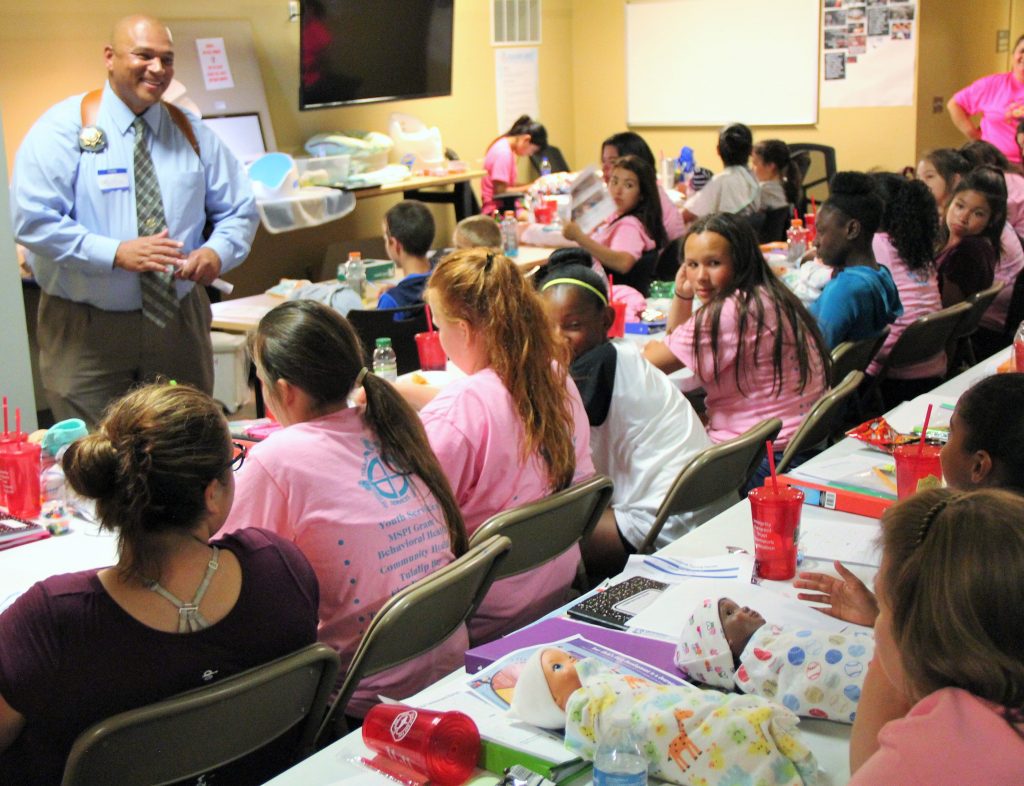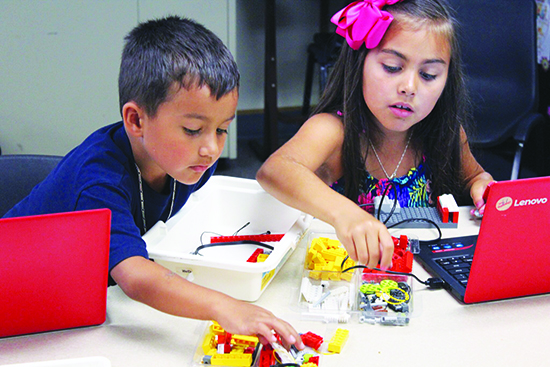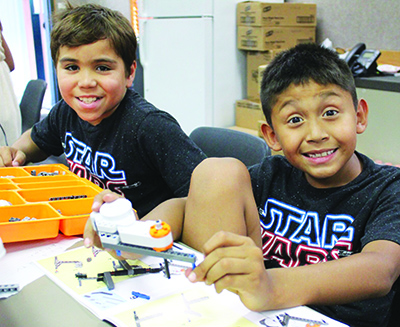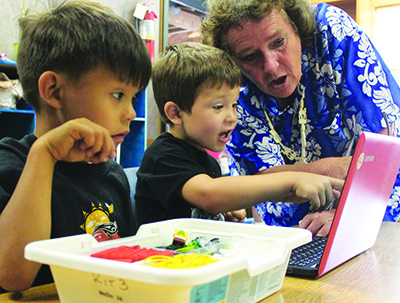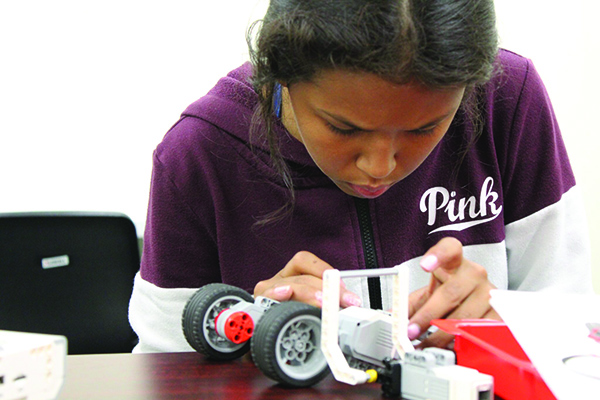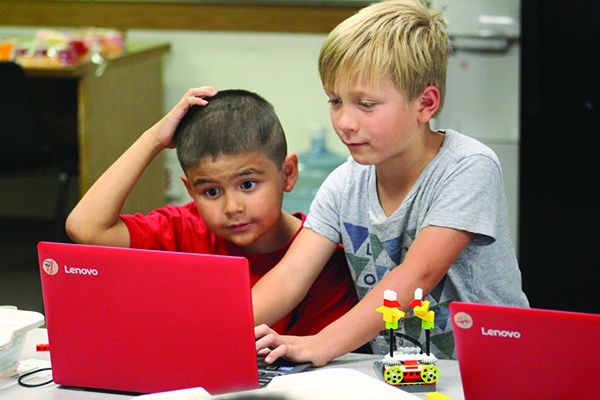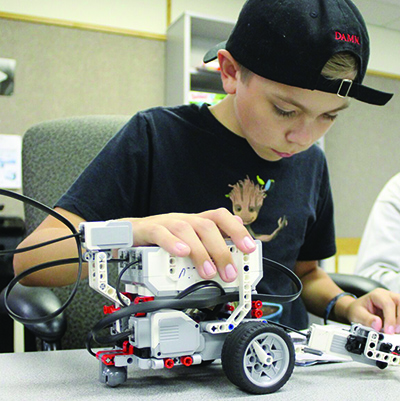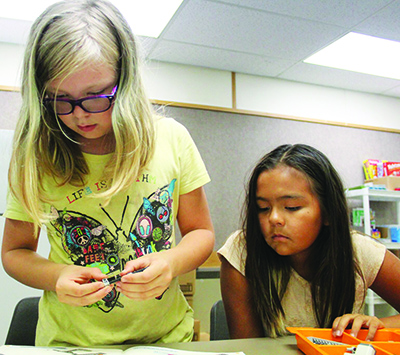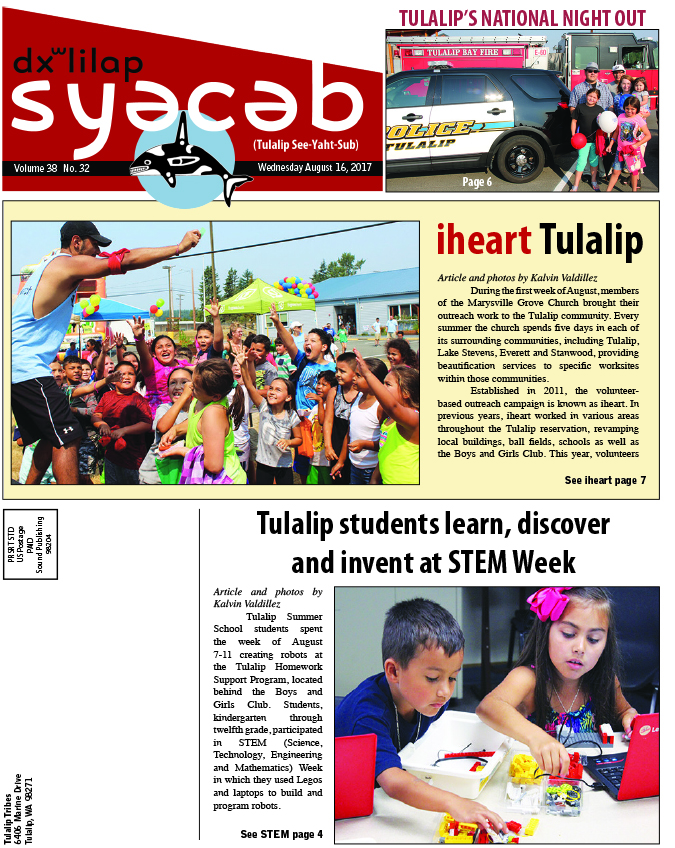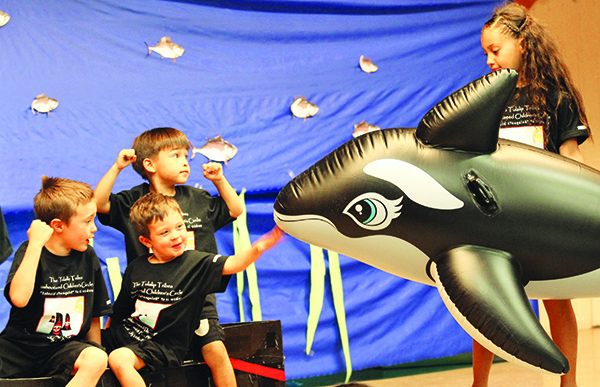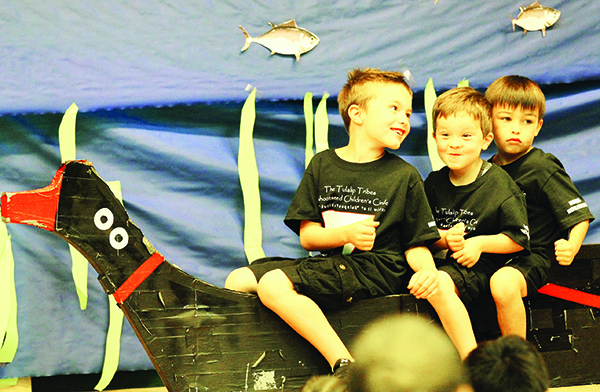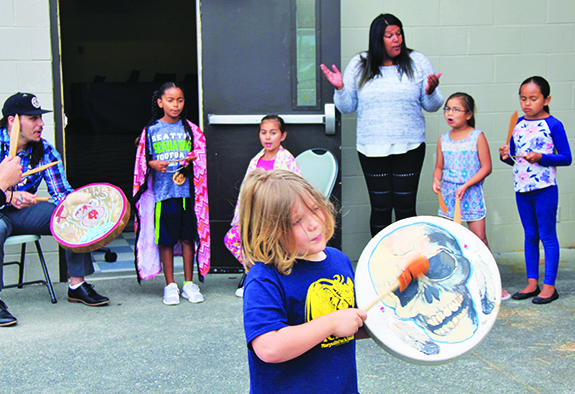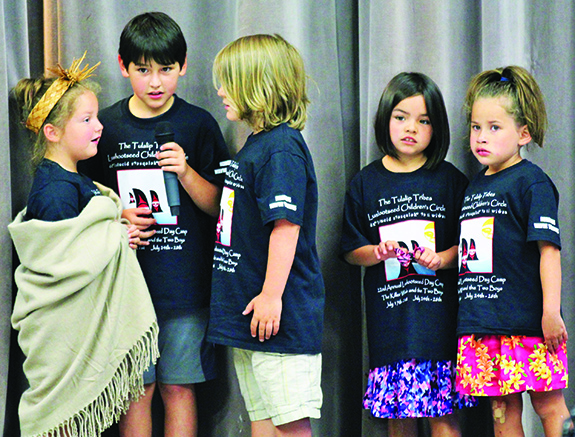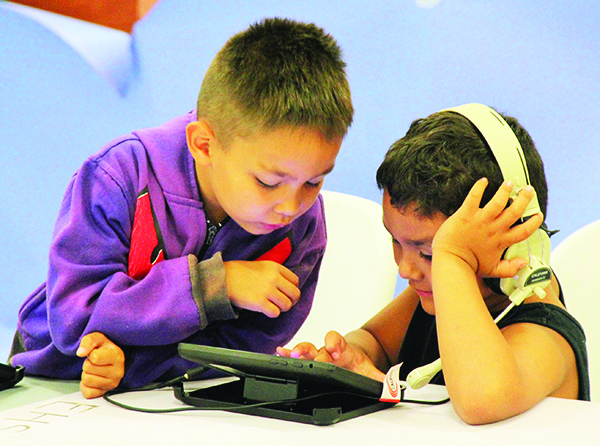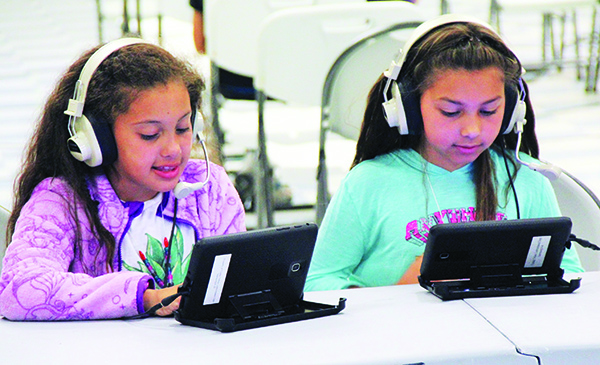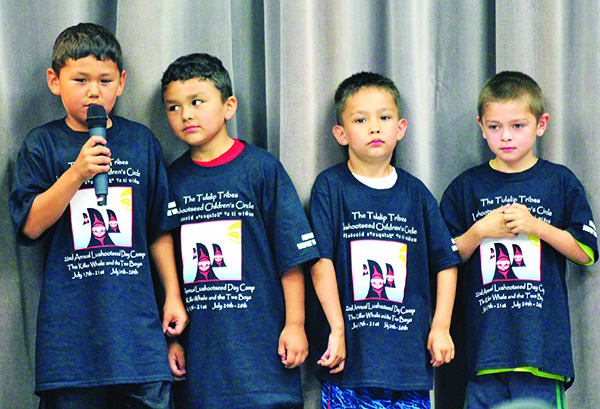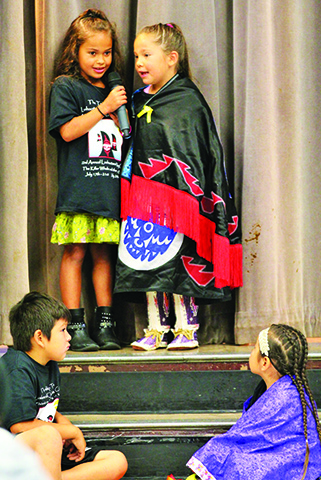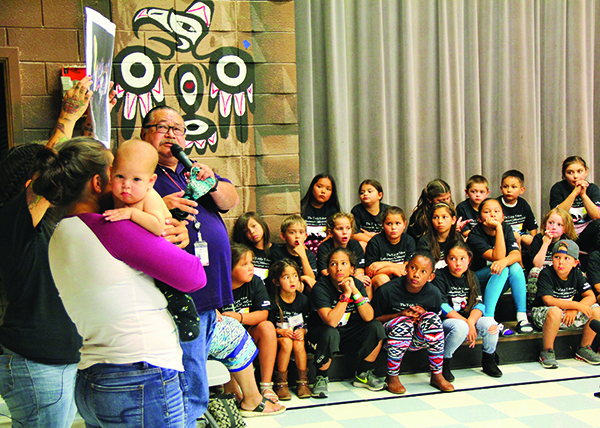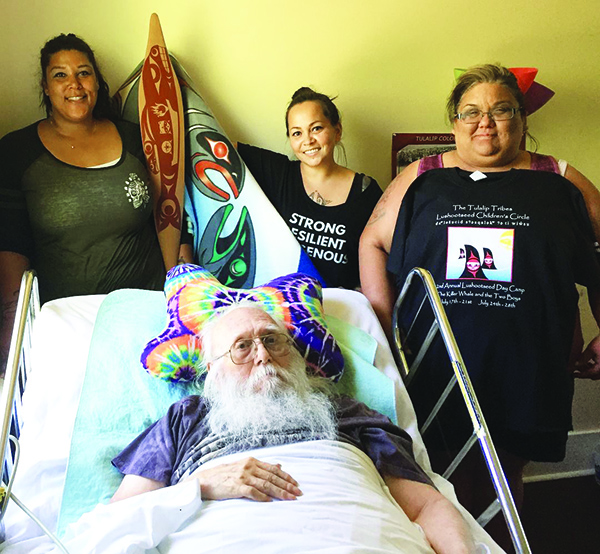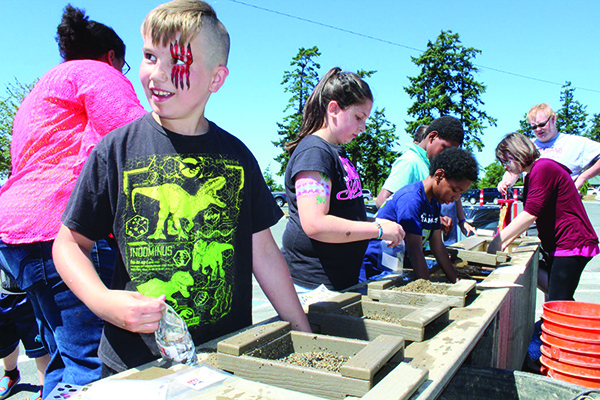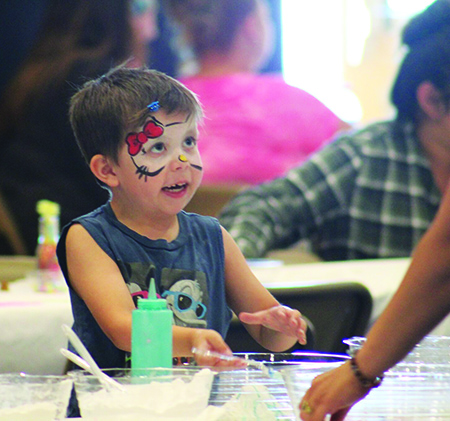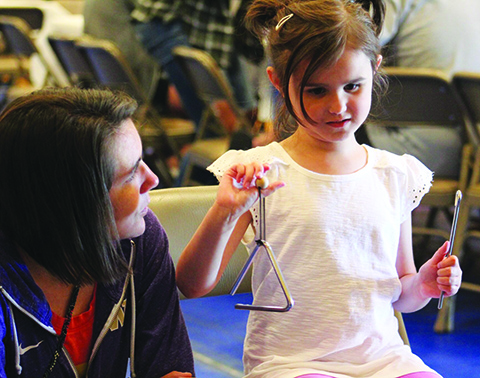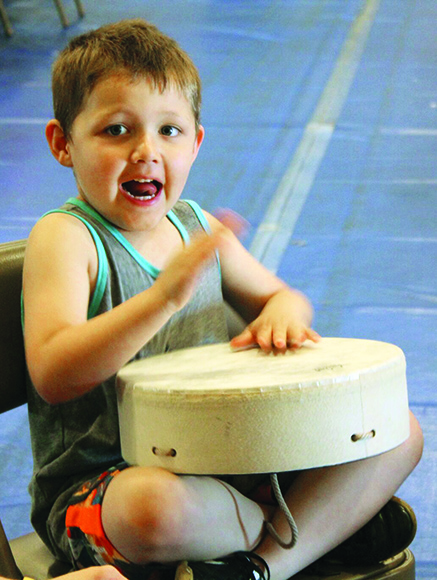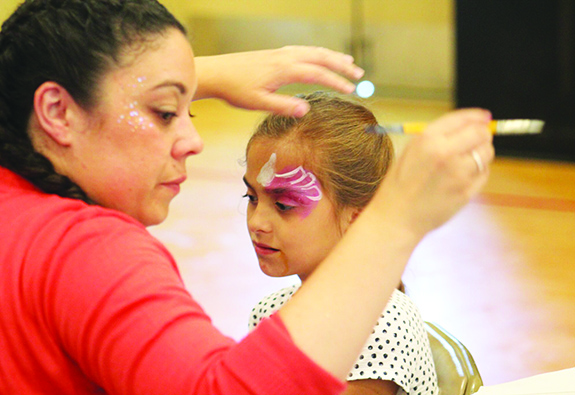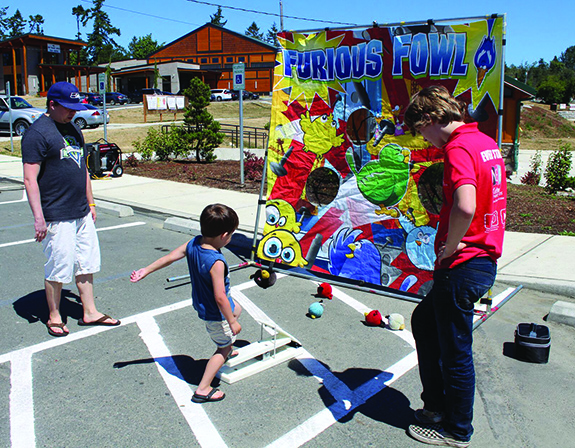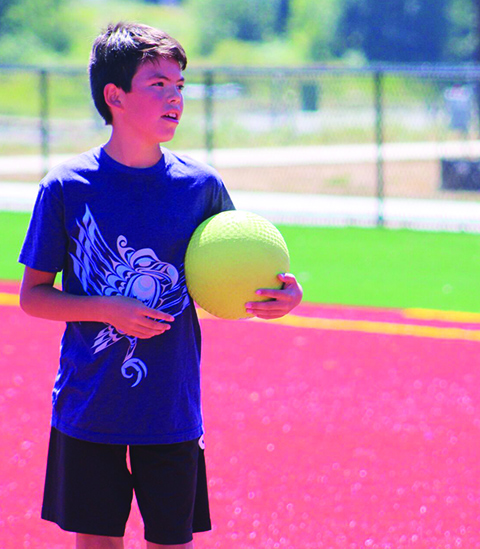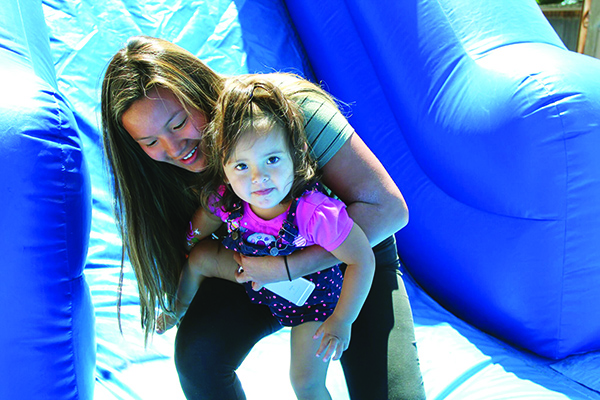Category: Tulalip News
Salmon Bake Fundraiser Benefiting Hibulb Cultural Center, Aug 19
Tulalip community celebrate National Night Out
“Let’s continue to help bring our youth and community together in a good way.”
– Josh Fryberg, Youth Services Coordinator
By Micheal Rios, Tulalip News
On the sizzling summer evening of Tuesday, August 1, Tulalip citizens of all ages and their neighbors came out to meet the police officers who have sworn an oath to protect and serve the community. The occasion was the 34th Annual National Night Out, free to all and held in the Tulalip Youth Center parking lot.
Tulalip Police Chief Carlos Echevarria greeted community members with a warm smile and a slice of public safety insight during the community-building event.
“The purpose of National Night Out is for the local community and law enforcement to come together against crime. Law enforcement cannot fight crime alone, we must have community support moving forward,” stated Chief Echevarria. “Under the body armor and police uniform, law enforcement officers exist as real people. Positive interactions and open conversation allows for the human side of policing to shine through and from this foundation trust is gained.”
National Night Out has been an annual occurrence since its inception in 1984. The ultimate goal is to promote police-community partnerships and neighborhood camaraderie to make our neighborhoods safer, more caring places to live. Enhancing the relationship between the community’s youth and law enforcement goes a long way to bringing back a true sense of community. It also provides a great opportunity to bring police and neighbors together under positive circumstances.
In light of it occurring on one of the hottest days of the year, dozens of families took part in the National Night Out mingling. While enjoying tasty hot dogs, green salads, and sugar treats, community members strolled through the informative safety demonstration tables. There were games and activities for the young ones to partake in, giving parents and guardians the perfect opportunity to connect with emergency personnel.
“We, along with a lot of other families, really enjoyed National Night Out. I saw a lot of smiles from the youth and community along with great information that was being provided to the people,” said Josh Fryberg, Youth Services Coordinator, who attended the evening’s activity with his family. “We want to thank Carlos and TPD for all of the work that they do for the Tulalip Tribes and community members. We’ve created a great partnership with TPD here at Youth Services with ‘pop with a cop’. It has been a great time for the youth and staff to get to know numerous TPD police officers. Let’s continue to help bring our youth and community together in a good way.”
Youth could be seen interacting with all levels of law enforcement. From meeting and petting the unit’s K9 officer, taking pics with officers for the always active social media accounts, to the youngest among them requesting a hug with a real life superhero.
Chief Echevarria says his favorite moment from National Night Out “was when a 4-year-old young lady asked me for a hug. When I kneeled down and gave her a hug then another child requested a hug as well. This type of interaction with our youth and community definitely makes us, Tulalip, unique. Very proud moment as Chief!”
iheart Tulalip
By Kalvin Valdillez, Tulalip News
During the first week of August, members of the Marysville Grove Church brought their outreach work to the Tulalip community. Every summer the church spends five days in each of its surrounding communities, including Tulalip, Lake Stevens, Everett and Stanwood, providing beautification services to specific worksites within those communities.
Established in 2011, the volunteer-based outreach campaign is known as iheart. In previous years, iheart worked in various areas throughout the Tulalip reservation, revamping local buildings, ball fields, schools as well as the Boys and Girls Club. This year, volunteers dedicated all of their efforts to remodel one building.
“Our site this year is at the Legacy of Healing,” states iheart Site Leader, Moyia Rossnagle. “Our project for this building is to give it a face lift; fresh paint, fresh deck stain, fix up the lines in the parking lot, plant flowers and prune the landscaping to make it more welcoming and more inviting for the women and children who are in crisis when they come here.“
Hundreds of Grove Church members of all ages volunteer their time to the local mission trips each summer. Parents who volunteer in iheart are encouraged to bring along their children to participate as well. Kids of the church, between the fourth and eighth grade, volunteer to work at the Kid’s Block Party, held towards the end of each iheart week. This year, the Block Party took place at the Tulalip Boys and Girls Club.
On the hazy warm summer day of August 3, the youth of the community experienced a fun-filled day, enjoying the many activities at the Block Party including super-soaker races, bouncy houses, carnival games, manicures and face painting.
“My favorite is the bouncy houses and the water balloons. The water is so fun because it’s too hot. I like everything here, its so fun,” exclaimed Tulalip tribal member, Sylus Edwards.
In it’s sixth summer, the iheart project continues to unite communities through their outreach services.
“Everyone here is a volunteer and donates their time because they want to give back to the communities and they want to serve other people,” explains Moyia. “It feels good to do that and it’s been such a rewarding week. We’ve met some really neat people; we’ve gotten to know the women who work here and made some new friends, it’s just been such a great week.”
For further details about the Grove Church and their iheart outreach campaign, please visit their website www.Grove.Church
Learning the business of babysitting
By Micheal Rios, Tulalip News
A free, daylong babysitting training class took place at the Tulalip Youth Center on Monday, August 1. Boys and girls age 11 and older learned how to perform basic child-care skills like diapering and feeding, first-aid essentials, development stages of children, helpful strategies for play activates, and the subtleties of child discipline.
An astounding thirty-eight youth showed up and participated in the daylong class. In coordination with Behavioral Health and Youth Services, the event aimed at making preteens and teenagers well-rounded caretakers was effective and made an immediate impact for several soon-to-be professional babysitters.
“We were inspired to share a class on babysitting because we wanted to focus primarily on teaching and encouraging our youth to expand their knowledge base, while teaching entrepreneurial skills to those who wished to start up a small business in the community,” states Monica Holmes, Youth Services Parapro. “Babysitting is something many kids do on a regular basis with family and close friends as they become teenagers. We wanted to arm them with the skill sets to be safe and marketable in order take their babysitting to the next step.”
Expanding the youths’ babysitting skill sets was achieved by taking advantage of those who could impart their professional knowledge on the subject, community resources who were willing to connect with the kids to make the biggest impact. Such resources included representatives from Tulalip Bay Fire and Rescue, Police Department, and Tulalip Community Health.
“I talked to the kids about safety in the home, as far as being a babysitter keeping themselves and the children they are supervising safe. We discussed the best practices for keeping kids safe in the home, protocol for answering the phone and what information should and shouldn’t be given out,” says Patrol Commander Sherman Pruitt, a 13-year veteran of the Tulalip Police Department. “We also went over how to stay prepared in the event of an emergency situation while keeping the safeguarding of their children the priority.”
Tulalip Bay Fire and Rescue taught basic first aid, choking hazards and in-home and personal fire safety. They also brought their ambulance and allowed participants to get in and ask questions. Tulalip Police Department spoke to youth about personal and home safety, like answering the door and telephone while babysitting, and what to do in the event of an emergency. Tulalip Community Health helped coordinate all the curriculum and hands-on teaching materials. Suzanne Carson LPN, was the co-presenter for the day and led various break-out sessions.
“We could have taught the class with just one or two instructors, but it seemed more enrichening to include these community partners. We wanted kids to learn from the best but also find people they could look up to or inspire to be like,” continues Monica. “Our community resources became mentors and positive examples in a large sense. It also helped to break down the barriers that sometimes exist between youth and organizations like the Police or Fire Departments.”
After each babysitter selected a baby doll of their choosing, complete with assigning it a gender and name, they were put into small groups. Through the course of the day, the thirty-eight aspiring babysitters rotated between different training stations set-up to replicate various real-life babysitting scenarios.
Instruction stations including the Potty Time Station, which featured all the supplies they’d need to properly diaper, change clothes and swaddle their infant or toddler. There was a First-Aid Kit Station that included supplies for basic first-aid in the event an emergency were to occur while babysitting. There was also a Babysitter’s Magic Bag Making Station, which included supplies, games, toys and arts-n-crafts items the youth could pack into a backpack and bring along with them to any babysitting job to keep their kids occupied and happy.
“Later in the day we designed hands-on Live Babysitting Stations where we invited community members to bring in their children ages 6-months to 10-years to be babysat by our newly minted babysitters,” explains Monica. “This is innovative to most mainstream babysitting classes in that most youth are never given a ‘trial run’ of babysitting in which staff and volunteers could observe, correct and praise their actual skills. We were so impressed with not only the maturity of the youth who attended, but also the drive and desire to take the skills they’d learned and create a real business out of them.”
At the end of the day all participating youth received a certificate of achievement and several take-home supplies to begin their very own babysitting business. Several of the youth have already developed some online advertisements for their new business. One such shining example is 11-year-old tribal member Mariana Richwine.
“I’ve been babysitting my younger sister since I can remember. Taking the babysitting class was fun and I learned a lot of tips and new information,” admits Mariana. “I learned what to do if a baby is choking and how to put a baby to sleep without being smothered by blankets. I’m more confident to babysit babies now that I know how to handle these situations.”
Since learning the added skills and importance of marketing herself as a certified, professional babysitter Mariana has created her own Facebook page titled Sissy’s babysitting service. She was joined in the babysitting class by her younger sister, 8-year-old Malana and older sister, 14-year-old Martelle. Their mother Nickie Richwine shared her impressions of the class she entrusted her three daughters to for the day.
“As soon as I learned about this training I knew my girls would be attending. They have always watched their little sister for me, and in the last two years my oldest ones started babysitting for friends and family. I knew there would be more they could learn in addition to their own experiences, and they did. I was happy to hear that our Tribal police and fire departments were also involved and taught the kids what to do in emergency situations. I feel like my girls are now well experienced and trained to babysit at any time.”
Tulalip students learn, discover and invent at STEM Week
By Kalvin Valdillez, Tulalipo News
Tulalip Summer School students spent the week of August 7-11, creating robots at Tulalip Homework Support, located behind the Boys and Girls Club. Students, kindergarten through twelfth grade, participated in STEM (Science, Technology, Engineering and Mathematics) Week in which they used Legos and laptops to build and program robots.
The Summer School partnered with Matthew and Kathy Collier, founders of the Robotics.How.com website, to bring the hands-on STEM experience to the Tulalip community, teaching the youth about coding through the use of Lego Mindstorms Robots.
“We’ve been working with the Lego Mindstorms Robots for nineteen years,” Kathy explains. “We have a variety of Lego Robotics education products and software. The youngest students are using what is called WeDo Lego Robots and they are actually programming tiny little Lego critters to dance, sing, flap and do all kinds of things. We have a monkey that drums, we have a giant that lifts himself from sleeping, so through the week they do different projects. What’s wonderful about the program is they are actually coding. The same coding a software engineer does on a big scale, on a much smaller scale. Each one of those children is building a little software program. The third through fifth graders are using what’s called the NXT Lego Mindstorms Robots and sixth grade and above are using the EV3 Lego Mindstorms.
“There are colleges such as MIT that use the Lego Mindstorm Robots to do different demonstrations. These are sophisticated robots,” she continues. “The kids are learning not only to design and build ideas, they’re learning to program. By the end of the week, all of these children will understand what many adults don’t, how to program a robot to dance, move and say things. The emphasis for STEM Week is discovery. Learn by discovery, learn by inventing, and learn engineering by doing, testing, trial and error; and we use a lot of Legos to do that.”
The kids were instantly intrigued and listened both excitedly and attentively to instructions before assembling their robots. Throughout the week, the fourth through twelfth grade students work in teams of two to fine-tune their bots. Students, sixth grade and older, are utilizing a new technology to control their machines with their minds. Without prior programing or the use of controllers, the students operate their Lego Robots by wearing a brainwave reader. The younger students spend their week creating new robots and projects each day.
“I think that robot camp is a fun place to think about robots,” states Summer School Student, Jordan Bontempo. “My favorite thing I did was playing with my robot, I like experimenting with it.”
Fellow classmate, Alo Williams added, “Its fun and I really like to learn here. I like that we get to build and program robots.”
Due to the program’s popularity and interest, the Tulalip Education Department intends to start a Lego Robotics team, comprised of teens from the community, to construct robots to perform in local competitions.
“To get these kids, especially the teenagers, to buy into this and not say ‘oh, this is boring’ is amazing. We haven’t had to push them once to participate, they want to do this,” says Homework Support Teacher Seiya Kitchens. “We’re trying to get a team together to represent Tulalip. The kids will be able to win awards and get to travel. I think there are a lot of kids that will benefit from STEM Week. Nowadays kids use more technology, so I think a program like this will reach more kids because it’s a transition from pen and paperwork to this.”
STEM Week provides a fun foundation for the children who wish to pursue a career in any of the four fields.
“This is such a techy age, kids are exposed to so much more,” Kathy states. “If these young minds start to show a hint of potential, we can start steering them towards thoughts that inspire engineering ideas. We give them the tools and let them learn and experiment. This is not about following a set of building instructions, we are turning them loose to explore, invent and create.”
For additional details please contact the Tulalip Homework Support Program at (360) 716-4646.
Tulalip Elders Luncheon, August 11
August 16, 2017 syəcəb
Please use the following link to download the August 16, 2017 issue of the syəcəb:
https://www.dropbox.com/s/69xnh1wht3vjpn5/Aug%2016%202017%20sy%C9%99c%C9%99b.pdf?dl=0
Learning from the past, looking to the future
22nd Annual Lushootseed Day Camp
By Micheal Rios, Tulalip News
The week of July 24-28 was nothing but pleasantly warm and sunny summer days in the Pacific Northwest. Inside the old Tulalip Elementary gymnasium even more radiating beams of sunshine could be found, created by the record turnout 92-kids participating in week two of the 22nd Annual Lushootseed Day Camp.
Open to children age five to twelve who want to learn about their culture and the language of their ancestors, Lushootseed Camp provides invaluable traditional teachings through art, songs, technology, weaving and storytelling. Each year the Lushootseed Department teams up with Cultural Resources, along with a select number of vital community volunteers, to hold two one-week day camps in the summer. Each camp is intended to have openings for up to 50 participants, but this year the demand was so high that 70-kids participated in week one and a stunning 92-kids comprised week two.
“It seems like every year we get more and more kids participating in our language camp, which is great!” boasts Michele Balagot, Lushootseed Manager. “We broke our record for total attendance that we set last year. It is amazing to witness the amount of participation and community involvement we received this year. It makes my heart happy seeing so many of our young ones learning our traditional language.”
With the extraordinary high turnout in camp participation came an equally impressive turnout in community volunteers who assisted Lushootseed staff coordinate daily camp activities. There were 25+ volunteers on a near daily basis on hand to help camp run smoothly.
“The role of the summer youth and volunteers was to be the group leaders, working alongside the youth, mentoring them and encouraging them at each station,” says Natosha Gobin, Lushootseed Teacher who has been involved with every Lushootseed Camp either as a participant or teacher for the past twenty years. “We met with the group leaders almost daily to go over their role and encourage them to be as involved with each of the kids as possible. There were three to four group leaders per group, which helped us ensure that the kids were staying on task at each station.”
Throughout the duration of camp, the children participated in seven different daily stations or activities. The following list is what each child accomplished throughout the week:
- Art – Votive candle holders, cedar photo frame.
- Weaving – Cedar medallions, paddle necklaces.
- Songs and Dances – Killer Whale Song, Berry Picking Song, Welcome Song, Kenny Moses Arrival Song.
- Traditional Teachings – Message from Wayne Williams, Killer Whale facts, story comparisons.
- Games – Various outdoor games incorporating Lushootseed.
- Language – Lushootseed alphabet, Killer Whale and the Two Boys key words.
- Technology – children learned and practiced Lushootseed materials related their final performance using handheld games on Tablets created by Dave Sienko.
For this 22nd Annual Lushootseed Camp, Wayne Williams was honored for his leadership and the teachings he has passed on to our community. His story “Killer Whale and the Two Boys” was selected as the final performance to be put on at week’s end.
“This year we honored Wayne Williams for his countless years of leadership for our people,” states Michele. “Wayne knew the importance of upholding the teachings that were instilled within him and many others. He has led our community as Assistant Manager and Manager of TTT, while also having served as a Board of Director, including time as Chairman. Wayne passed on his family’s traditional artifacts and documents to the Hibulb Cultural Center, and we are grateful to have such rich teachings within reach for us to continue to learn from.”
For the youthful camp participants, learning Wayne’s story “Killer Whale and the Two Boys” serves two purposes – learning and practicing the Lushootseed words it requires, and gaining knowledge of the lesson hidden within the story.
“The moral of this story is to watch who you hang around,” explains Natosha. “If you find the people you associate with tend to get in trouble, you will realize that you will end up getting in trouble right alongside them, and there are things that may happen to you along that path that will mark you for life and be a reminder of those hard times. Messages like this from our ancestors is so important for our kids to hear, understand and to respect in their early years as they develop into young adults. We can look at many situations in our lives and connect them to traditional stories.”
The closing ceremony for week two’s camp was held on Friday, July 28 in the old Tulalip Elementary gymnasium. The joyous, young play-performers made their theatrical debut to a large community attendance, as family and friends came out in droves to show their support.
“I am honored to be here today to witness the young children sharing in the Lushootseed language. The language is the very heart of our culture as Tulalip people,” proclaimed ceremonial witness Ray Fryberg, Executive Director of Natural Resources. “I thank the parents and families who gave their kids the opportunity to participate in our language camp. Also, I thank our Language Warriors for ensuring that this portion of our culture moves forward and stays alive. Our words are life, reflecting our ancestors and passing on their teachings.”
After the youth performed their rendition of “Killer Whale and the Two Boys” and the ceremonial witnesses had shared a few words, there was a giveaway. The camp participants gave handmade crafts to each and every audience member, which preceded a buffet-style lunch that everyone thoroughly enjoyed.
Reflecting on the conclusion of this year’s 22nd Lushootseed Camp, Language Warrior Natosha Gobin beamed with pride, “We continue to give thanks to those who had the vision to bring this camp to life, and we are grateful to be a part of keeping it going. These two weeks out of the year are really a blessing for us to give back to our community, build relationships with our youth and their families, and remind ourselves of our roles in the community. We are Language Warriors, we are Culture Warriors, and we will battle every day to ensure our traditional teachings live on for the next generation of warriors.”
_______________________________________________________________________
Honoring Wayne Williams
Submitted by Natosha Gobin
This year we honored Wayne Williams. His messages to our people, his leadership, his passion, it has touched so many lives and continues to do so. A couple of our staff members stepped away from camp on Monday, July 24th to visit Wayne and gift him with a paddle created by the Art & Design department, a blanket that was on behalf of the Hibulb Cultural Center staff and Lushootseed Staff, and a t-shirt from this year’s camp.
We felt it was important to gift him with these things and let him know how many youth were learning about his amazing work. It was an honor to speak to him and share that his work is still continuing with the teachings our youth are learning these two weeks.
One of Wayne’s famous quotes is “It’s important for us to know who we are and where we come from.” We are hoping to make more visits just to share with him how much he continues to inspire our people and allow each one of our staff members the chance to meet with Wayne.
Bringing youth and community together in a good way
By Kalvin Valdillez, Tulalip News
On a sunny Saturday afternoon, Tulalip Youth Services hosted Special Needs Field Day at the Don Hatch Youth Center. The July 29 event catered to children from the Tulalip community with learning and physical disabilities. The kids and their families were treated to an afternoon of fun activities including arts and crafts, face painting and bouncy houses; as well as friendly competition during a game of kickball.
“We wanted to create something specifically for the special needs students that wouldn’t overstimulate them,” states Tulalip Youth Services Education Coordinator, Jessica Bustad. “The idea actually came from a conversation we had at a parent meeting, talking about all the tribal events we have. They’re too over stimulating for some of our special needs students. We wanted to do something more low-key that still allows them to have fun and invite their favorite people with them.”
During Special Needs Field Day, youth enjoyed lunch at the Greg Williams Court with their families and participated in an interactive music circle with Victoria Fansler, Music Therapist for the Snohomish County Music Project. Victoria helps the youth of the Tulalip community work through traumatic life events by using music as an instrument of healing. Numerous kids joined Victoria in song by both singing and playing along with an instrument, among them was Tulalip tribal member Tyler Fryberg.
“I’m really excited that there is stuff for those kids with special needs to do,” exclaimed Tyler.
Tyler is an inspiration and role model to the Tulalip community, especially to those with special needs. A track and field athlete, Tyler carried the torch and participated in the 2013 Special Olympics Summer State Tournament.
“We are so excited that our community has the doors open for kids with special needs,” states Tyler’s mother, Mignonne Bedient. “Not only for the kids but for the parents also. We’ve had a few meetings and they have offered so much support for us. I truly believe we would not get the support outside of this community that we get here. Tyler has moved mountains and he has many more mountains to move, he’s so excited that there is a group here.”
The event was organized by Youth Services’ new Special Needs Advocate, Joe Boon. While researching for Special Needs Field Day, he discovered that activities with high sensory involvement were popular amongst children with disabilities.
“I started researching what we can bring to this event that gets them to tap into all their sensory needs,” Joe explains. “I wanted to give a feel for other tribal events that happen out here but more low-key, so it’s not off-putting for kids with severe sensory issues. I was researching other fun interactive things we can do and I found that with gold panning, they would be able to touch and find all kinds of [rocks and minerals], it turned out to be a huge success!”
A DJ played a variety of popular contemporary songs while the kids jumped about the bouncy houses and ran around the bases of the Alpheus ‘Gunny’ Jones Sr. Ball Field during the kickball match.
“The main objective is we just want the youth interacting with each other, the staff and the volunteers,” states Youth Services Activities Coordinator, Josh Fryberg. “At the end of the day, it’s all about having fun and just letting them be themselves.”
“Tulalip Youth Services would like to thank the parent committee, staff, volunteers and all of the youth and families who attended,” Josh continues. “Our hands go up to each and every one of you. The food was great; along with all of the arts, crafts, bouncy houses and of course the kickball game, which ended with a tie. Everyone was a winner and showed great sportsmanship. We would like to thank Joe Boone, Jessica Bustad and an extra special thank you to Jai Holmes. He is a 100% volunteer here at the Youth Services department and also attends MP as a student full time. He does an amazing job. Once again, we would like to thank everyone that attended and everyone who made this day possible. Let’s continue to bring our youth and community together in a good way.”
For additional information please contact Tulalip Youth Services Special Needs Advocate, Joe Boon, at (360) 716-4912.

